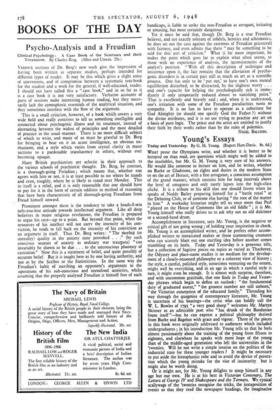BOOKS OF THE DAY
Psycho-Analysis and a Freudian
Clinical Psychology : A Case Book of the Neuroses and their Treatment. By Charles Berg. (Allen and Unwin. 25s.)
VARIOUS sections of Dr. Berg's new work give the impression of having been written as separate studies, perhaps intended for different types of reader. It may be this which gives a slight sense of unevenness, and of compromise between a systematic text-book for the student and a work for the general, if well-educated, reader. I should not have called this a "case book," and in so far as it is a case book it is not very satisfactory. Verbatim accounts of parts of sessions make interesting human reading, but they neces- sarily lack the atmospheric essentials of the analytical situation, and they sometimes interfere with the flow of the argument.
This is a small criticism, however, of a book which covers a very wide field and really contrives to tell us something intelligible and connected about psychogenic illness and its treatment, instead of alternating between the widest of principles and the most detailed of practice in the usual manner. There is no more difficult subject of which to write, and many of us must be grateful to Dr. Berg for bringing to bear on it an acute intelligence, an obvious en- thusiasm, and a style which varies from crystal clarity in many sections to a pardonable translucency in others, without ever becoming opaque.
Many British psychiatrists are eclectic in their approach to the various schools of psychiatric thought. Dr. Berg, by contrast, is a thorough-going Freudian • which means that, whether one agrees with him or not, it is at feast possible to see where he stands and even, roughly, where he is likely to stand next Monday. This in'itself is a relief, and it is only reasonable that one should have to pay for it in the form of certain oddities in method of reasoning that have been characteristic of all thorough-going Freudians from Freud himself onward.
Prominent amongst these is the tendency to take a heads-I-win tails-you-lose attitude towards intellectual argument. Like all deep believers in major religious revelations, the Freudian is prepared to argue his case—up to a point. But beyond that point, when the resources of his intellect will not carry the intensity of his con- viction, he tends to fall back on the intensity of his conviction as an argument in itself. Thus Dr. Berg writes : " The Morbid (or unreality) quality in the anxiety state provoked . . ." (by such conscious sources of anxiety as ordinary war traurgata) " can invariably be shown to be due . . . to the unconscious phantasy of castration." Now this is a statement of belief, and quite possibly of accurate belief. But it is taught here as by one having authority, and not as by the Scribes or the Statisticians. In the same way the Freudian's habit of ascribing an opponent's arguments to the operations of his sub-conscious and unrealised anxieties, whilst assuming that the properly analysed Freudian is himself free of such
handicaps, is liable to strike the non-Freudian as arrogant, irritating or amusing, but most certainly dangerous.
Yet it must be said that, though Dr. Berg is a true Freudian believer, and not exactly tolerant of infidels, heretics and schismatics, he does set out the case against the extremes of Freudian priestcraft with fairness, and even admits that there "may be something to be said for this' sort of criticism." What is far more important, he makes the point which goes far to explain what often seems, to those with no experience of analysis, the inconsistencies of the analyst's position. " With all this description of technique and insistence upon it, the fact remains that the alleviation of psycho- genic disorders is in certain part still as much an art as a scientific process. One has only to be ' put out,' to have one's own mental equilibrium disturbed, to be distracted, by the slightest worry . . . and one's capacity for helping the psychologically sick is imme- diately if only temporarily reduced almost to vanishing point." That is excellently and bravely said ; and, when it is understood, one's irritation with some of the Freudian peculiarities turns to sympathy. It is no fun to have to operate as a substitute for God Almighty (or should one specify God the Father ?) without the divine attributes, and it is no use trying to practise any art on a basis of pure logic. The priest and the artist are entitled to justify their faith by their works rather, than by the rules of polemics.
NIGEL BALCHIN.


































 Previous page
Previous page